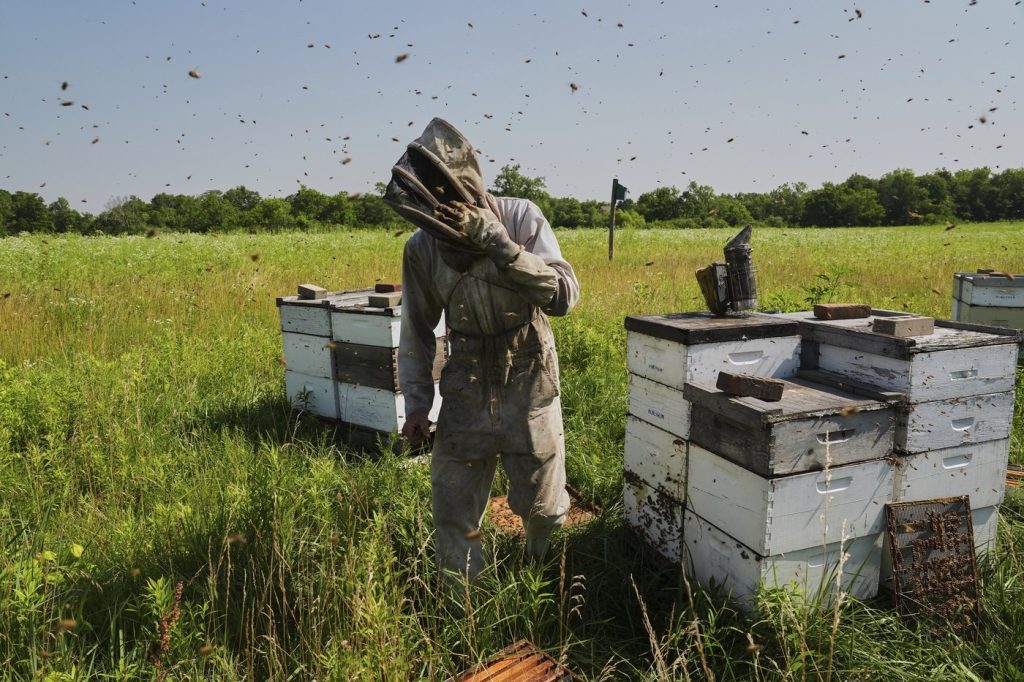WILLIAMSPORT, Ohio (AP) — On a sweltering June morning, Isaac Barnes navigates his honeybee hives while the heat causes sweat to bead on his face beneath his beekeeper's veil. The high temperatures in the area not only challenge him but also place immense stress on his bees, which can have body temperatures up to 27 degrees Fahrenheit (15 degrees Celsius) higher than the surrounding air. As global temperatures continue to rise due to climate change, researchers are keenly observing how this phenomenon affects both managed and wild bees, vital for crop pollination, nectar gathering, honey production, and reproduction.
A recent study reveals that bees exhibit adaptive behaviors to avoid overheating, such as employing fewer yet more intense wingbeats on particularly hot days. Moreover, they mimic human behavior by seeking cooler environments—whether shade or their nests—to escape the high heat. Jon Harrison, an environmental physiologist at Arizona State University and a co-author of the study, notes, “Just like we go into the shade, or we sweat or we might work less hard, bees actually do the exact same thing so they can avoid the heat.” However, these adaptations can impede their natural activities such as foraging for nectar and mating.
While many bees possess a degree of heat tolerance, climate change poses significant challenges that may reduce their ability to gather food and fend off diseases. Habitat loss, increased pesticide use, disease proliferation, and reduced forage availability are identified as key factors contributing to the global decline of bee populations. Margarita López-Uribe, a pollinator health expert at Pennsylvania State University, emphasizes that impaired health due to inadequate nutrition or chemical exposure exacerbates bees' susceptibility to heat.
This year, preliminary findings from the annual U.S. Beekeeping Survey indicate that beekeepers faced almost a 56% loss of managed colonies, marking the highest loss rate since the survey began in 2010. With most honeybee colonies in the U.S. dedicated to pollinating high-value crops such as almonds, apples, cherries, and blueberries, a shortage of pollinators could translate to diminished pollination rates and lower crop yields. López-Uribe warns of the fragility of this ecosystem: “It’s a very fragile system... If something goes wrong, you have these super high-value crops that won’t get enough bees for pollination.”
At Barnes’ operation, Honeyrun Farm, situated in Ohio, he manages around 500 hives and contends with challenges posed by extreme heat, particularly in managing parasitic mites that jeopardize bee health. High temperatures prevent him from applying essential medications like formic acid, which could harm bees if not utilized under proper conditions. Last year, nearly a third of the 400 hives he dispatched to California for almond pollination perished, with Barnes suspecting their compromised health was a result of earlier heat waves preventing effective mite management. “Dead hives aren’t pollinating the almonds,” he stated, highlighting the cascading effects of heat stress on agricultural practices.
Despite some positive outcomes, like a bumper honey crop from the blooming soybeans last summer, the general lack of plant diversity in regions dominated by corn and soybeans remains a concern for Barnes. The erratic timing of native blooms, as observed during autumn goldenrod flowering season, forces him to supplement his bees with additional food to ensure their vitality through winter. “Every single plant that blooms is something that the bee can use, and every single plant is affected by climate change,” he noted.
The scientific community has only recently begun to grapple with the alarming rates of pollinator decline, and limited data exists around how climate change and heat stress specifically contribute to these losses. Harrison stresses that the study of these factors, although crucial, is not yet widely explored within biology. Current political actions threaten funding for critical bee research; proposed budgets by the Trump administration include eliminating programs that support bee research and monitoring efforts, endangering continued study of these essential pollinators. U.S. Senator Jeff Merkley of Oregon has vocalized the urgent need for funding to safeguard America’s pollinators, noting their integral role in sustaining both the environment and agricultural productivity. Harrison warns that without adequate research funding, understanding and mitigating bee and pollinator losses will become increasingly difficult, potentially leading to rises in the prices of essential crops such as fruits, vegetables, nuts, coffee, and chocolate.












